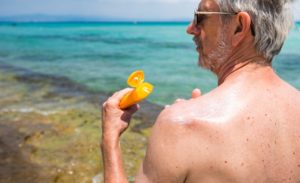 Many of us enjoy soaking up the sun in the summer, however, it is important that we do so safely and with discretion to prevent skin cancer.
Many of us enjoy soaking up the sun in the summer, however, it is important that we do so safely and with discretion to prevent skin cancer.
One of the best ways to protect our skin from the sun’s harmful rays is to wear sunscreen. Studies show that using sunscreen regularly reduces the incidence of melanoma (a form of skin cancer) by 50-73%.
Sunscreen works by preventing the sun’s ultraviolet (UV) radiation from reaching the skin. Your sunscreen’s ability to prevent radiation from damaging your skin is measured by its SPF (Sun Protecting Factor). It is highly advised that you use sunscreens with an SPF of 15 or higher, as this offers better protection.
The Skin Cancer Foundation also recommends using a broad-spectrum sunscreen which offers protection against UVA and UVB radiation. Too much exposure from either type of radiation has been linked to skin cancer.
Additional recommendations for proper sunscreen use include:
- Applying sunscreen approximately 30 minutes before sun exposure to ensure the product has enough time to properly bind to skin
- Applying sunscreen generously and regularly
- Checking product instructions for how often sunscreen should be applied
- Reapplying sunscreen after swimming or excessive sweating
It is important to keep in mind that protecting your skin from the sun does not only include wearing sunscreen. Remember to wear protective clothing or accessories such as broad-brimmed hats and long-sleeved shirts and limit the amount of time spent in the sun.
All content of this newsletter is intended for general information purposes only and is not intended or implied to be a substitute for professional medical advice, diagnosis or treatment. Please consult a medical professional before adopting any of the suggestions on this page. You must never disregard professional medical advice or delay seeking medical treatment based upon any content of this newsletter. PROMPTLY CONSULT YOUR PHYSICIAN OR CALL 911 IF YOU BELIEVE YOU HAVE A MEDICAL EMERGENCY.
